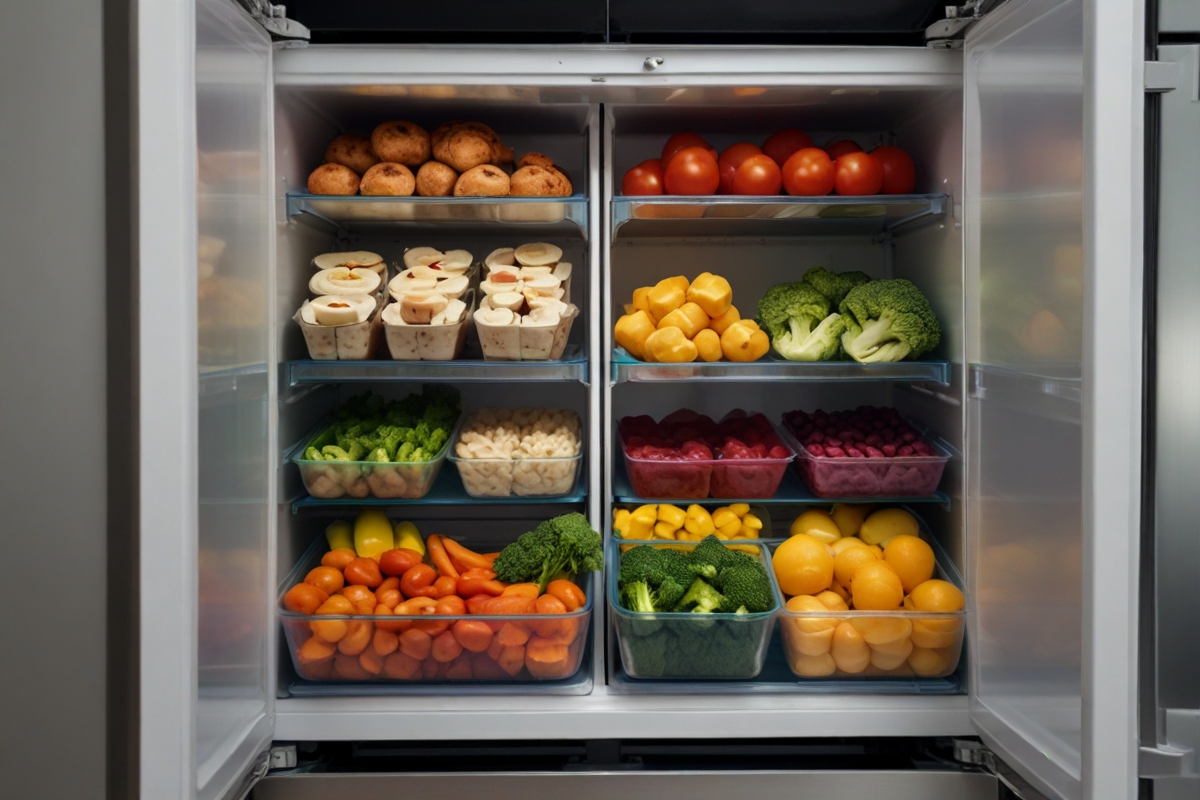Welcome to the practical guide on crafting meals that not only satisfy your taste buds but also stand the test of time. “What to Make for Dinner That Will Last a Few Days?” is more than just a question—it’s a lifestyle strategy that caters to busy schedules and reduces kitchen time during the week. This article delves into various dishes that are perfect for preparing ahead, ensuring you can enjoy delicious, home-cooked meals with minimal daily effort. By focusing on recipes that maintain their flavor and texture over several days, you’ll learn how to streamline your cooking process and embrace the art of meal prepping.

The Convenience of Make-Ahead Meals
Embracing Easy Evening Meals
In today’s fast-paced world, making time to cook fresh meals every night can be a challenge. Enter the concept of make-ahead meals—dishes designed to be cooked once and savored multiple times. This approach is not only a time-saver but also a stress reducer, allowing you to enjoy nourishing dinners without the nightly hassle.
Why Plan Meals That Last?
Planning and preparing one or two large meals can cover several days’ worth of dinners, which is especially handy for those with busy weekdays. Dishes like casseroles, stews, and hearty soups tend to fare well over time, sometimes even improving in flavor as their ingredients meld. Additionally, having meals ready in the fridge or freezer dramatically cuts down on the temptation to order takeout, supporting both your health and your budget.
In the following sections, we’ll explore various types of dishes that are ideal for making ahead, along with tips on meal planning and preparation strategies that ensure freshness and taste. Discover how embracing the make-ahead meal lifestyle can transform your dinner routine, making every evening meal a breeze. Stay tuned for Part 2, where we will dive into specific dishes that are not only easy to prepare but also designed to last, making your weeknights smoother and more enjoyable.
Best Types of Meals That Last
Durable Dishes for Multiple Meals
When it comes to preparing meals that last several days, certain types of dishes not only preserve well but often improve in flavor over time. Here we explore some of the best meal options that are perfect for making in large batches and are known for their staying power in the fridge or freezer.
Casseroles and Bakes
- Versatility and Flavor: Casseroles are the quintessential make-ahead meal. They typically involve layering ingredients such as pasta, rice, meats, and vegetables with sauces and cheeses, and then baking everything together. This method allows flavors to meld beautifully over time.
- Examples to Try: A classic lasagna, shepherd’s pie, or a vegetable gratin not only feeds a crowd but also tastes better the next day as the ingredients continue to combine and enhance each other.Explore these Dinner Recipes with Heavy Cream for rich, comforting options that are perfect for preparing ahead and enjoying throughout the week.
Slow Cooker Creations
- Set It and Forget It: Slow cookers are ideal for preparing large quantities of food with minimal effort. The low and slow cooking process tenderizes meats and blends flavors without any need for supervision.
- Recipes That Shine: Dishes like beef stew, chili, and pulled pork are perfect for slow cooking. These meals typically yield a lot and can easily serve as dinner for several nights, with flavors deepening each day.
Soups and Stews
- Comfort in a Bowl: Like casseroles, soups and stews are perfect for cooking in bulk and generally taste better after a day or two in the fridge as the ingredients’ flavors meld together.
- Standout Options: Minestrone soup, chicken tortilla soup, or a hearty bean stew not only offer nutritional benefits but also provide comfort and satisfaction from the first spoonful to the last.
These types of meals are not only practical but also provide a wholesome and comforting solution to weeknight dinners. By investing some time in preparation, you can enjoy several days of delicious meals that require little more than reheating. In the next section, we will delve into meal planning strategies that maximize the efficiency and effectiveness of your cooking, ensuring that you can make the most of these hearty dishes.
Meal Planning Strategies
Planning Your Meals for the Week
Effective meal planning is key to making the most out of dishes that last several days. By organizing what you cook and when, you can streamline your weekly food preparation and ensure you have tasty, healthy meals on hand at all times. Here are some strategies to help you plan like a pro. For additional ideas on quick and efficient meals that can last a few days, check out these Last Minute Dinner Recipes .
Portioning and Storage
- Smart Portioning: Divide cooked meals into individual portions before storing. This makes it easier to reheat only what you need for each meal, reducing waste and ensuring your food stays fresher longer.
- Proper Storage: Use airtight containers to store your meals. Glass containers are ideal as they don’t absorb flavors and can go from fridge to microwave safely. Labeling containers with the date and contents helps keep track of what you have and minimizes the chances of forgetting about hidden leftovers.
Balancing Nutrition
- Diverse Menu Planning: Plan your meals to include a variety of food groups. For instance, if you have a pasta dish one night, opt for a salad and protein combo the next. This helps maintain a balanced diet throughout the week.
- Incorporating Fresh Elements: Even when using leftovers, you can add fresh elements to enhance the meal. Toss a fresh salad, steam some vegetables, or add fresh herbs to rejuvenate leftovers and boost nutritional value.
Making Use of Technology
- Meal Planning Apps: Several apps can help you organize your meal planning. These tools can remind you of what you have in your pantry, suggest recipes based on your ingredients, and even send you reminders when it’s time to start cooking.
- Online Grocery Shopping: Leverage online grocery delivery services to ensure you have all the necessary ingredients for the week. This saves time and lets you plan your meals right from your phone or computer.
Regular Review and Adjustment
- Feedback Loop: Pay attention to what works and what doesn’t. If you find that certain dishes aren’t as enjoyable after a few days, consider adjusting your recipes or cooking methods.
- Seasonal Adjustments: Take advantage of seasonal produce by incorporating fresh fruits and vegetables into your meals. This not only improves taste and nutrition but also adds variety to your diet throughout the year.
By employing these meal planning strategies, you can maximize your time and effort, making weeknight dinners a breeze. Up next, we’ll explore specific recipes that are ideal for batch cooking and perfect for those looking to simplify their meal prep process.
Recipes That Last
Tried and True Recipes for the Week
Preparing meals that will last for several days without losing flavor or texture is a key part of efficient weekly meal planning. Here, we delve into some classic recipes known for their durability and taste improvement over time. These recipes are not only delicious immediately after cooking but also stand up well to storage and reheating.
Hearty Stews and Chilis
- Beef Stew: A robust beef stew made with chunks of tender beef, hearty root vegetables, and a rich broth can last for days in the fridge. As it sits, the flavors meld together, enhancing the depth and richness of the stew with each passing day.
- Vegetarian Chili: A thick, spicy chili made with beans, tomatoes, peppers, and an array of spices is perfect for batch cooking. It’s not only filling but also gains complexity in flavor as it rests, making it a perfect dish for several meals throughout the week.
Versatile Vegetarian Options
- Lentil Soup: Lentil soup is nutritious and filling, and its flavor develops beautifully over time. Lentils, vegetables, and aromatic spices combine to create a soup that is both comforting and satisfying on any day.
- Stuffed Bell Peppers: Filled with a mixture of rice, beans, vegetables, and seasonings, stuffed bell peppers are excellent for making ahead. They reheat well and can be varied by using different grains or adding different spices for some variety.
Meals That Morph
- Roast Chicken and Vegetables: Roast a large chicken with a medley of vegetables at the start of the week. Initially served as a roast dinner, the leftovers can easily transform into chicken salad, wraps, or incorporated into soups.
- Pasta Bake: A pasta bake with a tomato or cream-based sauce, vegetables, and cheese is ideal for reheating. Portions can be enjoyed throughout the week, and it’s versatile enough to add new ingredients to any leftovers to spice things up.
These recipes provide a foundation for meals that not only last but also keep mealtime interesting and flavorful. By preparing these dishes, you can ensure that you have reliable, tasty options on hand, reducing the need to cook new meals every night. Next, we’ll answer some frequently asked questions that can help you get the most out of your meal prepping efforts.
Tips for Keeping Meals Fresh
Keeping It Fresh
Ensuring that your prepared meals remain fresh and tasty over several days is crucial when batch cooking. Proper storage techniques and handling can make a significant difference in maintaining the quality and safety of your food. Here are some essential tips for keeping your meals as fresh as the day you made them.
Freezing and Reheating Tips
- Freezing: Not all dishes freeze well, but for those that do, freezing can be a great way to extend their shelf life. Soups, stews, casseroles, and baked pasta dishes are typically freeze-friendly. Cool these dishes completely before freezing them in airtight containers or heavy-duty freezer bags to prevent freezer burn.
- Reheating: When reheating frozen or refrigerated meals, make sure to thaw them properly if frozen and heat to an internal temperature of 165°F to ensure safety. Use an oven for even reheating of casseroles or a microwave for quicker results with soups and stews.
Avoiding Common Pitfalls
- Avoiding Contamination: Always use clean utensils when serving or portioning out meals to prevent bacterial growth. Avoiding cross-contamination is key to keeping meals safe to eat.
- Storage Containers: Opt for high-quality, airtight storage containers that can go from freezer to microwave or oven. Glass containers are ideal as they do not harbor smells or stains and maintain the integrity of the food’s flavor.
Proper Labeling and Rotation
- Labeling: Always label your containers with the date of cooking and contents. This practice helps keep track of how long foods have been stored and reduces the risk of consuming spoiled food.
- Rotation: Practice first-in, first-out in your fridge and freezer—use the oldest meals first to ensure quality and minimize waste.
Seasonal Adjustments
- Adapting Recipes: Modify your recipes based on available seasonal produce to enhance flavor and nutritional content. Fresh, seasonal ingredients can elevate a simple dish and are generally better for freezing and reheating.
- Adjusting Portions: Depending on your needs, consider preparing different portion sizes. Smaller portions thaw and reheat more uniformly, which is helpful if you’re eating alone or with a partner.
By following these tips, you can maximize the freshness and enjoyability of your prepped meals throughout the week. Maintaining a routine of good food safety and storage practices will ensure that your effort in the kitchen goes a long way in nourishing you and your family efficiently and deliciously. In the final part of this series, we will explore some frequently asked questions to help clear up any uncertainties and offer additional advice for your meal prepping journey.
Conclusion
Embrace the Ease of Cooking Once for Multiple Meals
As we conclude our guide on preparing dinners that last multiple days, it’s clear that with a little planning and the right techniques, you can vastly simplify your weekly cooking responsibilities. By choosing recipes that are designed to taste great over several days and utilizing efficient storage and reheating methods, you can enjoy delicious, home-cooked meals every night without the daily hassle.
The Benefits of Make-Ahead Meals
Make-ahead meals are not just a convenience; they are a strategy for healthier eating and stress reduction. By dedicating a few hours to cooking at the start of the week, you free up time on busier days, which can then be spent with family, on hobbies, or just relaxing. Additionally, by controlling the ingredients, you can cater to dietary needs and preferences much more easily than with store-bought or last-minute cooked meals.
Continuous Improvement
As with any routine, there’s always room for improvement. Continue to experiment with different recipes and techniques to find what works best for your schedule and taste preferences. Take note of which dishes tend to last better and which are most enjoyed by your family or housemates. Feedback is invaluable, and tweaking your approach based on real experience will only make your meal planning more effective.
Stay Inspired and Keep Learning
Finally, keep your meal prep interesting by incorporating seasonal ingredients, trying new recipes, and mixing up your meal types. The more enjoyable you make the process, the more likely you are to stick with it. There are countless resources available for finding new and exciting recipes that fit the meal prep model, so never stop exploring.
With these strategies and tips, you’re well-equipped to tackle a week of dinners with confidence and ease. Remember, the goal of cooking meals that last a few days isn’t just about saving time—it’s about making your life a little bit easier, one delicious dish at a time. Planning a special occasion? Prepare in advance with these Best Birthday Dinner Recipes that are sure to impress.
FAQs
Common Questions About Meal Prep
Meal prepping, especially when aiming for dishes that last several days, raises many questions. This section addresses some of the most frequent inquiries to help you optimize your cooking and ensure that your meals are not only convenient but also delicious and safe to eat.
What are the best types of meals to prepare in advance?
The best meals to prepare in advance are those that store well and whose flavors meld and improve over time. Stews, casseroles, soups, and chilis are ideal because they tend to taste even better after a day or two. Pasta dishes and cooked meats like roast chicken or pork are also excellent for several days of eating, provided they are stored correctly.
How long can cooked meals safely last in the refrigerator?
Most cooked meals can safely last in the refrigerator for up to four days if stored properly in airtight containers at or below 40°F (4°C). Always check for signs of spoilage, such as an off smell or mold, before consuming leftovers.
Can I freeze any meal prep dish?
While most meals can be frozen, the quality of some may diminish upon thawing and reheating. Dishes with high moisture content, such as soups and stews, freeze and reheat well. Cream-based sauces or dishes containing delicate vegetables or pasta might change in texture and are best enjoyed fresh.
What are some quick tips for making meal prep easier?
- Use a grocery list: Stick to a shopping list tailored to your meal plan to avoid impulse buys or forgetting ingredients.
- Batch cook: Cook large portions of versatile base ingredients, like grains or proteins, to use in different dishes throughout the week.
- Invest in quality containers: Good quality, compartmentalized containers can keep different meal components separate and fresh.
- Schedule a prep day: Dedicate a few hours one day per week to handle most of your meal prep, which can include chopping veggies, cooking meats, or assembling complete dishes.
How can I add variety to meals prepped for the week?
To avoid monotony, vary your condiments, spices, and side dishes. Incorporate different herbs and seasonings, switch up your vegetables, or throw a new sauce into the mix to transform the flavor profile of your base ingredients dramatically.
By addressing these FAQs, you can tackle meal prep with greater confidence and creativity, ensuring that your dinners are not just convenient but also a highlight of your day. As we continue to explore meal prepping, remember that the key is to find what works best for your lifestyle and preferences.




